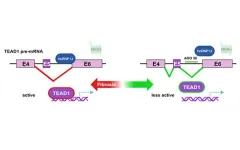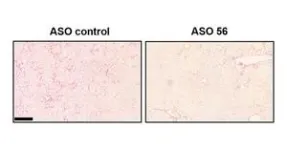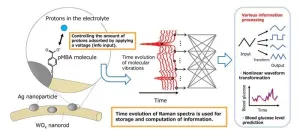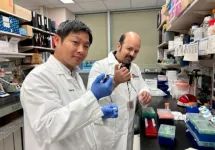(Press-News.org) A healthy liver filters all the blood in your body, breaks down toxins and digests fats. It produces collagen to repair damaged cells when the liver is injured. However, a liver can produce too much collagen when an excess accumulation of fat causes chronic inflammation, a condition called metabolic dysfunction-associated steatohepatitis (MASH). In an advanced state, MASH can lead to cirrhosis, liver cancer and liver-related death.
The cells that produce collagen in livers are called hepatic stellate cells (HSC). In a new paper published in Cell Metabolism, scientists from the University of California San Diego investigated how these cells are activated. They found a three-component signaling pathway in the nucleus that functions according to a sort of police-controlling-the-police model.
In healthy livers, the first molecule in the pathway inhibits a second molecule, which inhibits the molecule that stimulates collagen-producing genes. MASH scales down the first molecule, so that inhibition is lifted on the second and third molecules, leading to stimulation of collagen production.
After discovering the signaling pathway, the scientists designed a short piece of RNA to prove the pathway behaved the way they thought it did. This RNA, called an antisense oligonucleotide (ASO), was so effective that it not only proved the viability of the pathway but also prevented liver fibrosis — too much collagen in the liver — without causing any side effects. The scientists are currently discussing licensing the ASO as a therapeutic with various pharmaceutical and biotech companies.
“All the molecules in the pathway were known, but no one knew if or how they interacted. We put the pathway together, showing each step in this intracellular signaling module. That was the science of the research. The clinical message is this ASO, which can actually block liver fibrosis,” said Jerrold Olefsky, a professor of medicine and assistant vice chancellor for integrative research at UC San Diego Health Sciences, and senior author on the paper.
The scientists carried out their investigations in organoids — tiny little livers in a dish made from three types of liver cells fed a MASH cocktail of fatty acids, fructose and sugars. They found that in normal livers, the first component of the pathway, a nuclear seven-transmembrane protein called TM7SF3, inhibits a splicing factor called hnRNPU. hnRNPU refrains from splicing out an inhibitory exon in the messenger RNA (mRNA) of TEAD1, a transcription factor that controls the genes that produce collagen. The inhibitory exon, exon 5, keeps TEAD1 from turning on the collagen-producing genes.
In the MASH-fed organoids, TM7SF3 is reduced and does not inhibit the splicing factor. The active splicing factor splices out the inhibitory exon in the transcription factor, which turns on the genes that produce collagen. This is called alternative splicing.
Furthering their investigations, they designed an ASO to keep hnRNPU from splicing out exon 5. “It had the sequence that would put it just upstream of exon 5 where hnRPU binds. The ASO prevented the splicing factor from binding to the TEAD mRNA, so it couldn’t ultimately splice it out. We got pretty much only inactive TEAD when we treated MASH mice with the ASO,” said Olefsky. With TEAD inactivated, collagen wasn’t produced. Neither was fibrosis.
“These findings show the key role of alternative splicing in shaping progression of fibrotic liver disease,” said Roi Isaac, Ph.D., assistant project scientist, Medicine, and first author on the paper.
When ASOs are administered intravenously, they enter every cell in the body, not just the target cells. Serendipitously, the scientists found that within the liver, this hnRNPU mechanism only operated in stellate cells. That made their ASO both highly effective and highly specific — the epitome of good drug design.
According to Olefsky, a quarter of the U.S. population has MASH. While the scientists’ ASO may well be an effective treatment, getting FDA approval for it would necessitate enormous clinical studies and could cost up to a billion dollars.
Olefsky and his team identified a much less common disease called primary sclerosing cholangitis, or PSC. It's relatively rare, often fatal, and until now there were no good treatments. When the scientists tested their ASO on a mouse model of PSC, they found that their ASO almost completely blocked the development of the disease. “Getting FDA approval for PSC would be easier than getting it for MASH,” said Olefsky, “so we’re currently talking to biotech and pharma partners about licensing the ASO for PSC.”
Additional authors are: Gautam Bandyopadhyay, Theresa V. Rohm, Sion Kang, Jinyue Wang, Narayan Pokhre, Sadatsugu Sakane, Rizaldy Zapata, Avraham M. Libster, Asres Berhan,Tatiana Kisseleva, Zea Borok, Francesca Telese, Nicholas JG Webster of the University of California San Diego, and Varon Vinik and Yehiel Zick of the Weizmann Institute of Science, Israel.
This study was funded by the National Institutes of Health, the Swiss National Science Foundation, the Larry L. Hillblom Foundation, and Janssen Pharmaceuticals.
# # #
END
Scientists discover a new signaling pathway and design a novel drug for liver fibrosis
Their research could lead to treatment for a variety of liver diseases and conditions.
2024-04-26
ELSE PRESS RELEASES FROM THIS DATE:
High-precision blood glucose level prediction achieved by few-molecule reservoir computing
2024-04-26
1. A collaborative research team from NIMS and Tokyo University of Science has successfully developed a cutting-edge artificial intelligence (AI) device that executes brain-like information processing through few-molecule reservoir computing. This innovation utilizes the molecular vibrations of a select number of organic molecules. By applying this device for the blood glucose level prediction in patients with diabetes, it has significantly outperformed existing AI devices in terms of prediction accuracy.
2. With the expansion of machine learning applications in various industries, there's an escalating demand for AI devices that are not only highly ...
The importance of communicating to the public during a pandemic, and the personal risk it can lead to
2024-04-26
**ECCMID has now changed its name to ESCMID Global, please credit ESCMID Global Congress (formerly ECCMID, Barcelona, Spain, 27-30 April) in all future stories**
In global crises like the COVID-19 pandemic, it is vital that scientists step forward to engage with the public and help deliver medical and scientific advice in a friendly, digestible and open format. While the traditional way for scientists to do this is by responding to media requests, alternatives, including collaborating with illustrators and local communities, will be discussed in a new ...
Improving health communication to save lives during epidemics
2024-04-26
During epidemics of Ebola, COVID-19, Zika and other public health emergencies, effective communication of public health messages is crucial to control the spread of disease, maintain public trust, and encourage compliance with health measures. In a new evidence review to be given at this year’s ESCMID Global Congress (formerly ECCMID) in Barcelona, Spain (27-30 April), Dr Benjamin Djoudalbaye from the Africa Centres for Disease Control and Prevention (AFRICA CDC) in Ethiopia, will discuss the challenges and lessons learnt from public health communication strategies during multiple epidemics across ...
Antimicrobial-resistant hospital infections remain at least 12% above pre-pandemic levels, major US study finds
2024-04-26
Hospital-related infections resistant to carbapenems, considered the antibiotics of last resort for treating severe infections, remain at least 35% higher than before the pandemic.
Findings also reveal that during the pandemic, hospitals experiencing surges due to high volumes of severely ill COVID-19 patients had the greatest increases in hospital-acquired antimicrobial-resistant infections, as did larger hospitals with increased bed capacity.
**ECCMID has now changed its name to ESCMID Global, please credit ...
German study finds antibiotic use in patients hospitalised with COVID-19 appears to have no beneficial effect on clinical outcomes
2024-04-26
Findings underscore need for rational antibiotic use especially during viral pandemics like COVID-19.
*ECCMID has now changed its name to ESCMID Global, please credit ESCMID Global Congress (formerly ECCMID, Barcelona, Spain, 27-30 April) in all future stories**
Antibiotic treatment of adults hospitalised with moderate COVID-19 is associated with clinical deterioration, despite the drugs being given to over 40% of patients, according to new research being presented at this year’s ESCMID Global Congress (formerly ECCMID) in Barcelona, Spain (27-30 April)
The findings underscore the need to discourage indiscriminate prescribing ...
Targeting specific protein regions offers a new treatment approach in medulloblastoma
2024-04-25
Targeting specific protein regions offers a new treatment approach in medulloblastoma
Scientists at St. Jude Children’s Research Hospital discovered a new compound that selectively targets parts of a cancer-related protein, EP300/CBP, in Group 3 medulloblastoma.
(MEMPHIS, Tenn. – April 25, 2024) Medulloblastoma (the most common malignant childhood brain tumor) is separated into four molecular groups, with Group 3 bearing the worst prognosis. By studying EP300 and CBP, critical proteins in Group 3 medulloblastoma cells, scientists at St. Jude Children’s Research Hospital designed a way to enhance anti-tumor ...
$2.7 million grant to explore hypoxia’s impact on blood stem cells
2024-04-25
INDIANAPOLIS — Indiana University School of Medicine scientists are on a mission to understand why hematopoietic stem cells, responsible for producing all types of mature blood cells, exhibit better responses in a low-oxygen environment within the bone marrow, also known as hypoxia. Their discoveries and innovative approaches could influence treatment options like bone marrow transplantation for conditions such as bone marrow failure and rare blood diseases involving gene corrected stem cells.
A new four-year, ...
Cardiovascular societies propel plans forward for a new American Board of Cardiovascular Medicine
2024-04-25
CV Societies Propel Plans Forward for a New American Board of Cardiovascular Medicine
Planning enters next phase as ABMS announces open comment period
WASHINGTON (April 25, 2024) – Efforts by the American College of Cardiology, American Heart Association, Heart Failure Society of America, Heart Rhythm Society and The Society for Cardiovascular Angiography & Interventions to create a new, independent American Board of Cardiovascular Medicine under the American Board of Medical Specialties (ABMS) are closer to becoming a reality with the creation of a formal Board of Directors and the announcement by the ABMS Advisory Board on Specialty Board Development of an open comment ...
Hebrew SeniorLife selected for nationwide collaborative to accelerate system-wide spread of age-friendly care for older adults
2024-04-25
Hebrew SeniorLife is among the 30 US health systems nationally, and the only one in Massachusetts selected to participate in the Age-Friendly System-Wide Spread Collaborative.
This first-of-its-kind Collaborative, led by the Institute for Healthcare Improvement (IHI), will accelerate and spread the adoption of evidence-based, high-quality care for older adults across all of their sites and care settings.
The Collaborative is the latest endeavor of the Age-Friendly Health Systems initiative, which promotes four evidence-based elements of high-quality care known as ...
New tool helps identify babies at high-risk for RSV
2024-04-25
A new tool to identify infants most at risk for severe respiratory syncytial virus (RSV) illness could aid pediatricians in prioritizing children under 1 to receive a preventive medication before RSV season (October-April), according to Vanderbilt University Medical Center (VUMC) research published in Open Forum Infectious Diseases and to be presented at the American Thoracic Society 2024 International Conference.
Study authors considered factors including birth month, birth weight and whether an infant has siblings to determine who is most at risk of severe RSV illness ...
LAST 30 PRESS RELEASES:
Brainwaves of mothers and children synchronize when playing together – even in an acquired language
A holiday to better recovery
Cal Poly’s fifth Climate Solutions Now conference to take place Feb. 23-27
Mask-wearing during COVID-19 linked to reduced air pollution–triggered heart attack risk in Japan
Achieving cross-coupling reactions of fatty amide reduction radicals via iridium-photorelay catalysis and other strategies
Shorter may be sweeter: Study finds 15-second health ads can curb junk food cravings
Family relationships identified in Stone Age graves on Gotland
Effectiveness of exercise to ease osteoarthritis symptoms likely minimal and transient
Cost of copper must rise double to meet basic copper needs
A gel for wounds that won’t heal
Iron, carbon, and the art of toxic cleanup
Organic soil amendments work together to help sandy soils hold water longer, study finds
Hidden carbon in mangrove soils may play a larger role in climate regulation than previously thought
Weight-loss wonder pills prompt scrutiny of key ingredient
Nonprofit leader Diane Dodge to receive 2026 Penn Nursing Renfield Foundation Award for Global Women’s Health
Maternal smoking during pregnancy may be linked to higher blood pressure in children, NIH study finds
New Lund model aims to shorten the path to life-saving cell and gene therapies
Researchers create ultra-stretchable, liquid-repellent materials via laser ablation
Combining AI with OCT shows potential for detecting lipid-rich plaques in coronary arteries
SeaCast revolutionizes Mediterranean Sea forecasting with AI-powered speed and accuracy
JMIR Publications’ JMIR Bioinformatics and Biotechnology invites submissions on Bridging Data, AI, and Innovation to Transform Health
Honey bees navigate more precisely than previously thought
Air pollution may directly contribute to Alzheimer’s disease
Study finds early imaging after pediatric UTIs may do more harm than good
UC San Diego Health joins national research for maternal-fetal care
New biomarker predicts chemotherapy response in triple-negative breast cancer
Treatment algorithms featured in Brain Trauma Foundation’s update of guidelines for care of patients with penetrating traumatic brain injury
Over 40% of musicians experience tinnitus; hearing loss and hyperacusis also significantly elevated
Artificial intelligence predicts colorectal cancer risk in ulcerative colitis patients
Mayo Clinic installs first magnetic nanoparticle hyperthermia system for cancer research in the US
[Press-News.org] Scientists discover a new signaling pathway and design a novel drug for liver fibrosisTheir research could lead to treatment for a variety of liver diseases and conditions.




